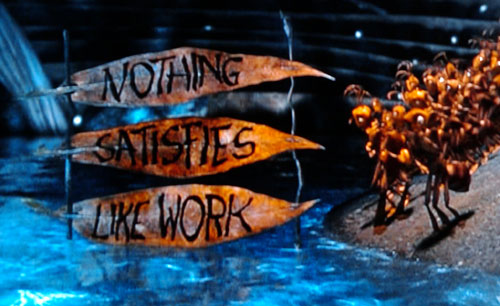The saying “Working Hard Never Killed Anyone” is often offered as an excuse by management encouraging workers to work insane 50, 70, 80 hour weeks for no overtime pay but there is clear evidence that overwork can damage the organisation you work for because you’re likely to make more mistakes and spread illness to others, have negative effects on your health or even kill you.

In high school I did a few weeks work experience in several organisations. One old employee told me some really useful advice while pointing at a sea of cubicle workers .. activity and being busy doesn’t mean a person is getting any useful work done but it is an effective way to avoid catching the eye of a manager for slacking off!
Employees who don’t take take holidays can also be really bad for a company, not just because it means the employee could quit at any time and get their leave paid out in cash but because being at work everyday makes it easier to commit fraud. It nearly killed french bank Société Générale when one of it’s employees committed long term fraud costing them €4.9 billion.
Presenteeism is also a big problem for organisations and the people who work in them. Have you ever gone to work even though you were really sick or suffering from a severe emotional shock? That’s presenteeism.
Health insurer MBF explains why presenteeism is bad for everyone:
Presenteeism is defined as the lost productivity that occurs when employees come to work but as a consequence of illness or injury are not fully functioning. Presenteeism is largely thought to arise through fear of loss of income or employment. Employees that work when ill are more prone to injury and, if contagious, increase the risk of passing on an illness to other employees.
Judging workers by the number of hours worked and what times they arrive and leave at work rather than their productivity eg: tasks completed, profitability improved etc can lead to a culture of unhealthy overwork.
Japan’s rise from the devastation of World War II to economic prominence between 1945 and 1975 was not without human cost. People cannot work for ten or twelve hours a day six and seven days a week, year after year, without suffering physically as well as mentally.
But during the first three postwar decades no one paid any special attention to the larger than usual number of men in their 40s and 50s who died of brain and heart ailments, most often from acute cardiac insufficiency and subarachnoid hemorrhage.
It was not until the latter part of the 1980s, when several high-ranking business executives who were still in their prime years suddenly died without any previous sign of illness, that the news media began picking up on what appeared to be a new phenomenon.
This new phenomenon was quickly labeled karoshi (kah-roe-she), or “death from overwork”, and once it had a name and its symptoms were broadcast far and wide, it just as quickly became obvious that Japan was experiencing a virtual epidemic.
Business Week recently reported that Anxious Japanese Are Working Themselves to Death:
It will take more than an improved economy to alleviate the underlying reasons for Japan’s growing army of stressed workers. Many attribute Japan’s high suicide rate—which topped 30,000 in 2008 for the 11th consecutive year, more than double the U.S. rate—and increasing number of mental illnesses among workers to restructuring carried out during Japan’s “lost decade” in the 1990s. But as the economy recovered, and grew steadily between 2001 and 2007, leaner companies put more pressure on workers, while wages failed to keep pace with rising corporate profits.
For sure, the culture of hard work, even when it risks worker health, runs deep. One government survey found that nearly 90% of workers say they didn’t even know what the term work-life balance meant. And 4 out of 5 say they would cancel a date if asked by a superior to work overtime, according to a poll by the Japan Productivity Center for Social-Economic Development, a Tokyo think tank.




Leave a Reply